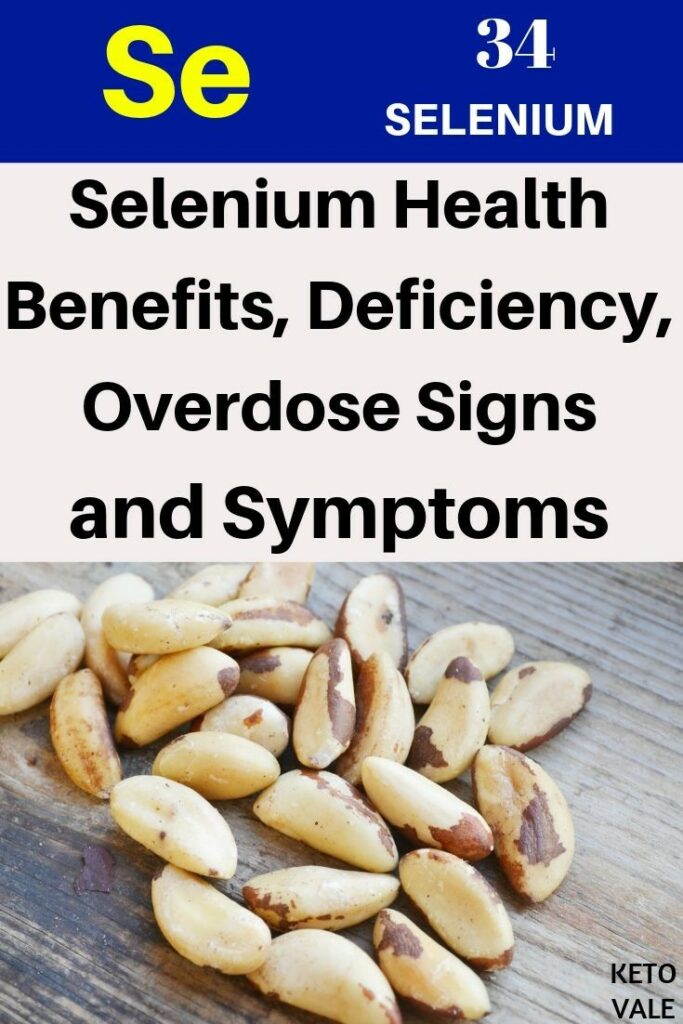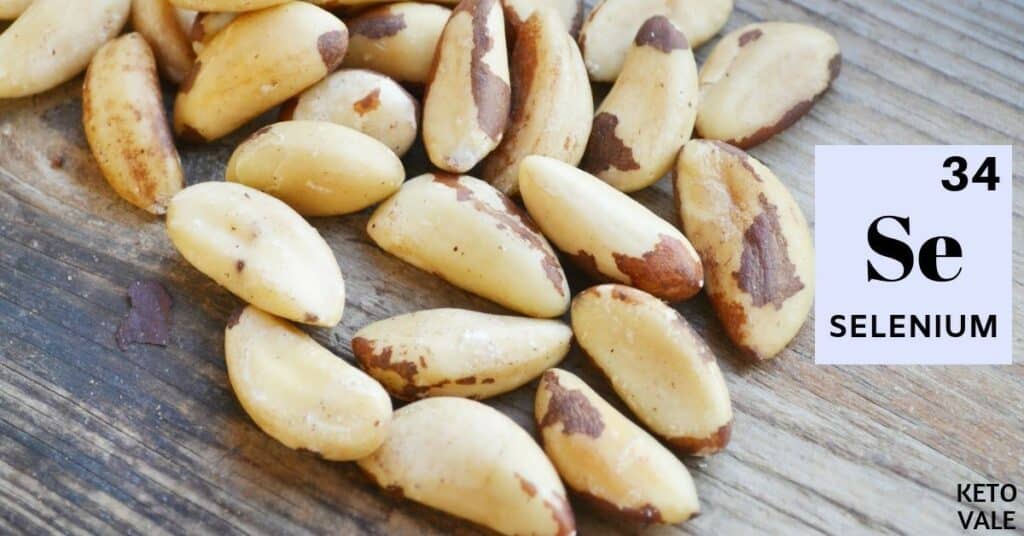Selenium is a micronutrient that is naturally present in many different foods, such as Brazil nuts, seafood, poultry, meat, eggs, and some grains and dairy products.
Our bodies need it for a number of vital functions. It plays an important role in thyroid health, cognitive function, protection from oxidative stress, and is important for metabolism, among others.
How much selenium you are getting from food sources depends on your location, and in particular, on the soil quality, you are getting it mostly from grains (1).
For people who follow a low-carb or ketogenic diet, they can get their selenium from animal products, and seafood in particular.
Top Six Benefits of Selenium
#1. Has Cancer-Protective Properties
Selenium has the outstanding ability to reduce DNA damage and to protect against certain cancers, such as breast cancer, lung cancer, and prostate cancer, among others (2).
Additionally, studies have concluded that selenium supplementation, if selenium status wasn’t adequate, could help cancer patients in their recovery from the illness and from treatment, and when combined with radiotherapy, it helped them manage radiotherapy side effects better and improved their overall quality of life (3).
Poor selenium content in soil in some parts of the world is also associated with higher cancer risk, compared to places where the soil is rich in selenium.
#2. Improves Thyroid Health
Selenium deficiency could negatively impact thyroid function and in some cases, it could even lead to hypothyroidism and other thyroid diseases (4).
Similarly to iodine, selenium plays an important role in thyroid hormone metabolism, and its highest concentration levels in the human body are in the thyroid gland.
The thyroid gland has a number of essential functions in maintaining optimal health, such as regulating your breathing, heart rate, body temperature, metabolism, and more (5).
Selenium supplementation is also found to be beneficial in patients with thyroid eye disease (Graves’ orbitopathy) (6).
#3. Improves the Functioning of the Immune System
The immune system is incredibly complex and researchers are still studying all the ways that it works and ensures our health.
Boosting your immune system is therefore not something you can do with a single supplement, but is more a function of your health status in general, and adequate selenium levels play an important role in that (7).
Blood levels of selenium within the healthy range are associated with a strong immune system, capable of fighting off pathogens and diseases (8).
People deficient in selenium have a worsened immune function and might struggle with common diseases more often.
Additionally, people who have an immune deficiency such as HIV, might benefit from selenium supplementation and have their immune system respond positively to it (9).
Patients with hepatitis C, tuberculosis and the flu might also experience similar effects from supplementing with selenium, as their immune system is already very busy fighting off the main disease they have (10).
#4. Has Antioxidant Properties
Selenium has powerful antioxidant properties, which means that it helps control the amount of free radicals in your body, and lessens the oxidative stress they cause to cells (11, 12).
This is actually one of the main reasons for its other health benefits and in particular, the role it plays in the proper functioning of your immune system, as well as its cancer and heart protective properties.
#5. Helps Combat Cardiovascular Disease
Getting enough selenium from your diet is one of the things you can do to keep heart disease at bay.
Low selenium blood levels are associated with a higher risk of coronary artery disease (13).
More research is needed for us to actually draw conclusions, as these findings were based on observational studies, but at the same time, other studies have demonstrated that selenium can lower the production of oxidized LDL (the “bad”) cholesterol (which is oxidized by free radicals) and, as a result, lower the risk of cardiovascular disease (14, 15).
Oxidized cholesterol and lipids build up as plaque in the arteries, and lead to atherosclerosis, which is a major risk factor for a number of cardiovascular diseases, such as stroke and heart attacks.
Nevertheless, so far no studies have demonstrated a need to supplement with selenium in order to prevent heart disease, therefore, getting enough selenium from food seems to be the best strategy.
#6. Prevents Cognitive Decline
The antioxidant properties of selenium might also play a role in preventing cognitive decline in older people; oxidative stress is one of the contributing factors to diseases such as Alzheimer’s, Parkinson’s, multiple sclerosis and others.
In studies, normal levels of selenium and other micronutrients (such as DHA, folate, vitamin E, C, and B12) were associated with a lower incidence of Alzheimer’s disease (16).
Although the connection between the two is not yet fully understood, and therefore selenium supplementation is, again, not advised as a preventive strategy, getting enough micronutrients from your food is essential for minimizing the risk of various age-related diseases.
How Much Selenium Do You Need?
Recommended daily intake for adults is of 55 mcg (µg or microgram), and most people manage to get enough selenium from food (17).
Selenium deficiency
Supplementation with selenium is rarely necessary, and most people in the US have an adequate selenium status.
Nevertheless, it’s a good idea to be mindful of your selenium consumption, as selenium deficiency, although rare, can have a number of serious symptoms, such as hypothyroidism, fatigue, and diminished cognitive capacities.
If you suspect that you might be deficient in selenium, it’s best to test your blood levels before you add a selenium supplement to your daily regime.
Selenium overdose
Selenium overdose, although rare, is also possible, and even if you’re getting selenium only from food, it’s still possible to get too much of it. The maximum safe dose of selenium is 400 mcg and should not be exceeded (18).
Excessive consumption of selenium-rich foods (for example, Brazil nuts or mussels), especially if those are combined with a selenium supplement, could lead to chronically elevated levels of selenium.
Some of the symptoms of selenium toxicity include garlic breath, fever, nausea, fatigue, hair loss, and others.
For that reason, it’s a good idea to eat foods that are particularly rich in selenium only occasionally, and not to supplement with it, unless your doctor advises you to, based on blood test results.
Do not supplement with selenium without prior testing.
Low-Carb Sources of Selenium
These good sources of selenium that are also low in carbs which you can add to your meal plan are:
- Brazil nuts
- Fish and seafood, such as tuna, halibut, sardines, shrimp, mussels
- Meat, such as pork (and ham in particular), beef steak, beef liver, ground beef
- Poultry – chicken and turkey meat
- Eggs
- Mushroom
- Spinach
Other sources of selenium, that are higher in carbs, include brown rice, oatmeal, grains, and beans, among others.
Related: Selenium rich foods list
The Takeaway
Selenium is an essential mineral that plays a role in a number of vital functions of our bodies, and therefore it’s important to make sure that you’re getting enough of it from your diet.
It’s not likely that you need to supplement additional selenium, and you could actually have too much of it, so if you suspect being deficient in selenium, talk to your doctor and have your selenium levels checked with a blood test.
A healthy diet rich in whole, natural food is a great way to make sure you’re getting enough selenium from your food. Eating meat, eggs, and seafood, especially shrimp, tuna or mussels, will definitely help you maintain healthy selenium levels.
Alternatively, if you’re vegan or vegetarian, Brazil nuts are also a great source of selenium. Just make sure you’re not eating too much of them.
A single brazil nut contains 95.9 mcg of selenium, which is almost twice the daily recommended amount (you can still have a few of them – just not every day) (19).
Having an adequate selenium status is one of the things that will protect you against a number of illnesses and will help your body keep the levels of free radicals in check. Of course, a number of other micronutrients also have an essential role in helping you maintain optimal health, so a varied diet seems to be key.
Enjoy this post? Share to save for later!

Photo credit: mariakarabella / depositphotos.com







